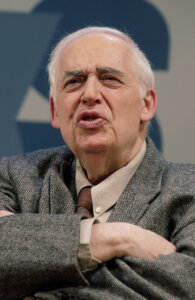Did this Jewish literary titan have the right idea about Harry Potter and J.K. Rowling after all?
Legendary critic Harold Bloom found Rowling to be a subpar writer whose work was replete with cliches

J.K. Rowling in 2019. Photo by Getty Images
The great American Jewish literary critic Harold Bloom, who died in 2019 at the age of 89, notoriously panned the first volume of J.K. Rowling’s Harry Potter series of novels in a review. He did so ostensibly for aesthetic reasons.
Since then, Rowling has become a vocal critic of the trans rights movement and recently gloated online after an April 16 U.K. Supreme Court ruling rescinded basic civil rights of trans people, following a court case brought in Scotland that she partially bankrolled from her estimated billion dollar fortune.
Bloom had opined that Harry Potter and the Sorcerer’s Stone lacks an “authentic imaginative vision” found in works by immortal authors like Lewis Carroll or Rudyard Kipling. Indeed, Bloom produced an anthology for young readers not long after, Stories and Poems for Extremely Intelligent Children of All Ages. It featured texts mostly by 19th-century writers, thereby missing an opportunity to show off the talents of contemporary English Jewish authors of children’s books, like Judith Kerr, Liz Kessler, Dina Leifer, Francesca Simon and Michael Rosen.
But Bloom’s aim was not to investigate new Jewish writing; he simply felt that Rowling wrote badly, with a weakness for repeatedly using cliches such as stretching one’s legs instead of simply stating that a character took a walk.
With comparable insistence, Rowling has persisted in tweeting anti-trans arguments, sometimes misrepresenting American Jewish authors, as in June 2020, when she cited the feminist Andrea Dworkin to back her claims: “Men often react to women’s words — speaking and writing — as if they were acts of violence; sometimes men react to women’s words with violence.”
Yet as Dworkin’s widower John Stoltenberg wrote in 2020, Dworkin was a supportive ally for the beleaguered trans minority. Indeed, Stoltenberg asserted that Dworkin, whose books have recently been reprinted in a Penguin series, expressed an “egalitarian ethic and humane vision” that has been distorted in anti-trans polemics.
Although Jewish readers and others were drawn to the Potter books worldwide for their championship of outcasts and underdogs, in real life Rowling has selectively withheld that empathy, regularly punching down at vulnerable minorities.
Glamour magazine recently criticized Rowling for singling out for attack to her millions of X (formerly Twitter) followers an Italian Paralympic sprinter named Valentina Petrillo. A visually impaired trans woman aged 51, Petrillo won no competitive prizes, but was nevertheless called a “cheat” by Rowling, who likened Petrillo to Lance Armstrong, the champion cyclist who lied about using performance-enhancing drugs.
Yet Petrillo had told no lies, and had been accepted by the Paralympic organization. “You’d think a writer [like Rowling] would choose her words with more care,” Glamour wrote.

This same expectation was at the heart of Harold Bloom’s critique. His own childhood reading material was unusual even for a brilliant Jewish kid of his generation. Raised in the Bronx, where he spoke Yiddish with his family before learning English at age 6, Bloom’s preferred boyhood reading consisted of works by advanced modernist poets such as a Hart Crane.
Early on, Bloom learned to recognize inspired writing when he saw it, and he was certain that Rowling was not on this level. He asked Potter fans who argued that the books were persuading millions of children about the value of reading: “Why read, if what you read will not enrich mind or spirit or personality?”
Of late it has become clear that writing the Potter series did not necessarily open the mind or enrich the spirit of its author. So frequent and vehement have been her anti-trans proclamations that actors from the hit Potter films, including Daniel Radcliffe, have publicly disassociated themselves from her views.
In a statement notable for its humility, Radcliffe stated that calling transgender women men, as Rowling has repeatedly done, “erases the identity and dignity of transgender people.” Worse, Radcliffe added, it “goes against all advice given by professional health care associations who have far more expertise on this subject matter than either [Rowling] or I.”
But Rowling seems to believe she has nothing to learn from anyone. She recently squabbled online with a correspondent who noted that in 1933, the Nazis burned books written on LGBTQ+ subjects by the pioneering German Jewish physician Magnus Hirschfeld. In reply, Rowling mistakenly denied that the Nazis persecuted trans people.
Perhaps paradoxically, she has also repeatedly restated her support for England’s Jews; she has opposed boycotting Israel and proclaimed her solidarity with the U.K.’s currently beleaguered Jewish population of under 280,000. She has also retweeted comments about antisemitism by the English Jewish comedians David Baddiel and David Schneider.
Rowling’s endorsement of Jews, as far as it goes, is not in doubt, despite a distracting claim during a 2021 podcast by Jon Stewart that the hook-nosed goblin bankers who run Gringotts Wizarding Bank in the Potter books and films resemble antisemitic caricatures.
Although Stewart was quick to deny that he was accusing Rowling of any personal antisemitism, the online critic Noah Berlatsky claimed in 2022 to find parallels between the purported anti-Fascist messaging of the Potter series and the Gringotts Wizarding Bank crypto-Jewish imagery. Berlatsky saw a “clear distinction between Rowling’s clumsy, clueless use of antisemitic caricature and her enthusiastic, ideological embrace of transphobic hate.” He added: “Rowling’s campaign of hatred against trans people has been much more harmful, and much more consequential, than her goblins.”
Two years earlier, another critic, Rachel Simon, had likewise inquired about the contradiction between the Potter books’ lessons about equality and minority rights and their author’s own declared convictions. Simon suggested that, perhaps unintentionally, Rowling has created an “army” of international readers who will “grow up in direct opposition to her own hateful transphobia.”
These arguments are doubtless more optimistic than the conclusions of Harold Bloom, who in a 2005 interview reiterated that the minds of young readers of the Potter books are “deadened by cliches.” Bloom added the proviso: “But of course it is an exercise in futility to try to oppose Harry Potter.”
If and when Jews and other readers tire of the fictional world of J.K. Rowling, Bloom may be remembered as an early harbinger of its unreality, concealing as it does the banality of adamant antipathy to a tiny, persecuted minority group.

















